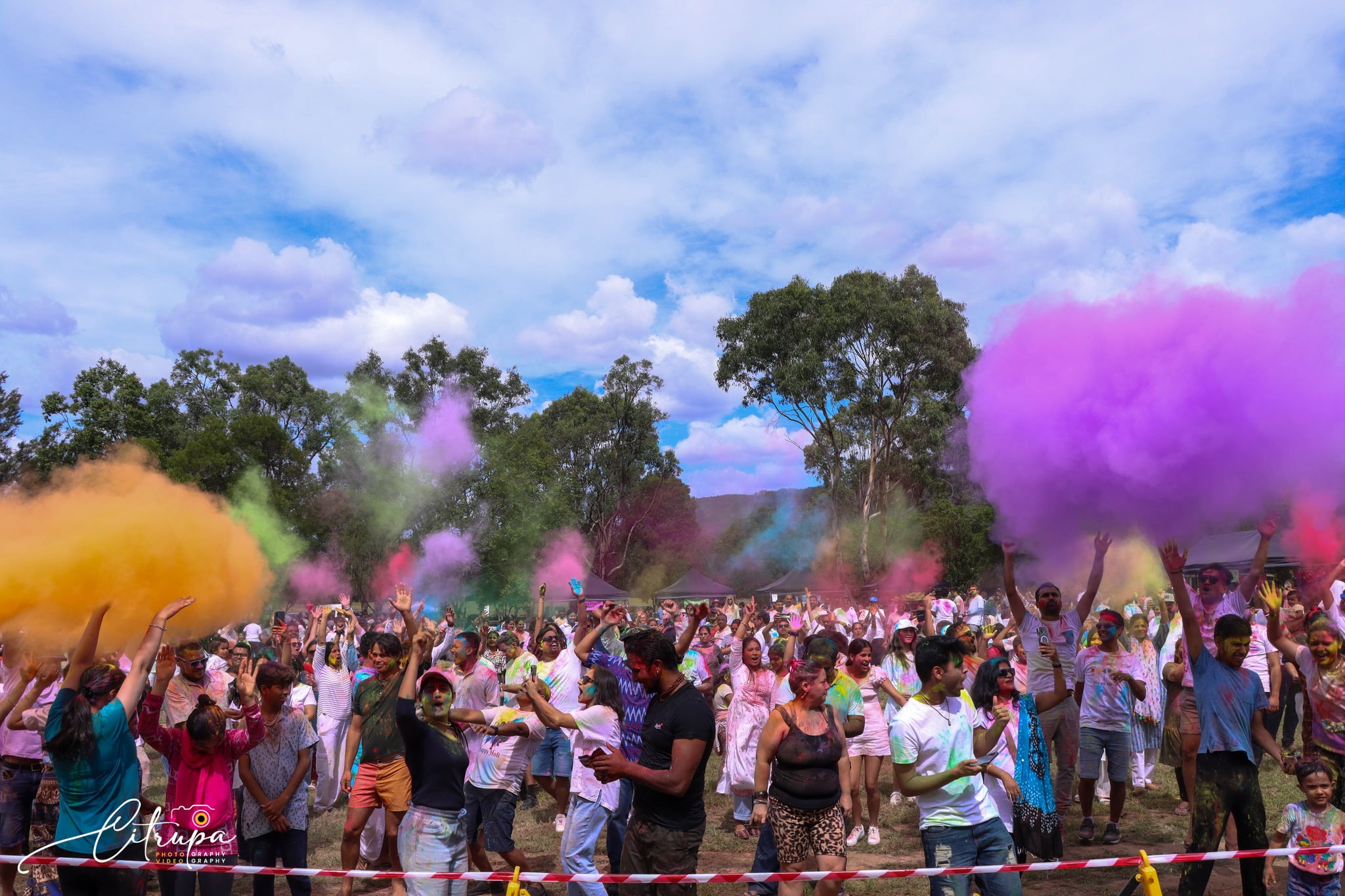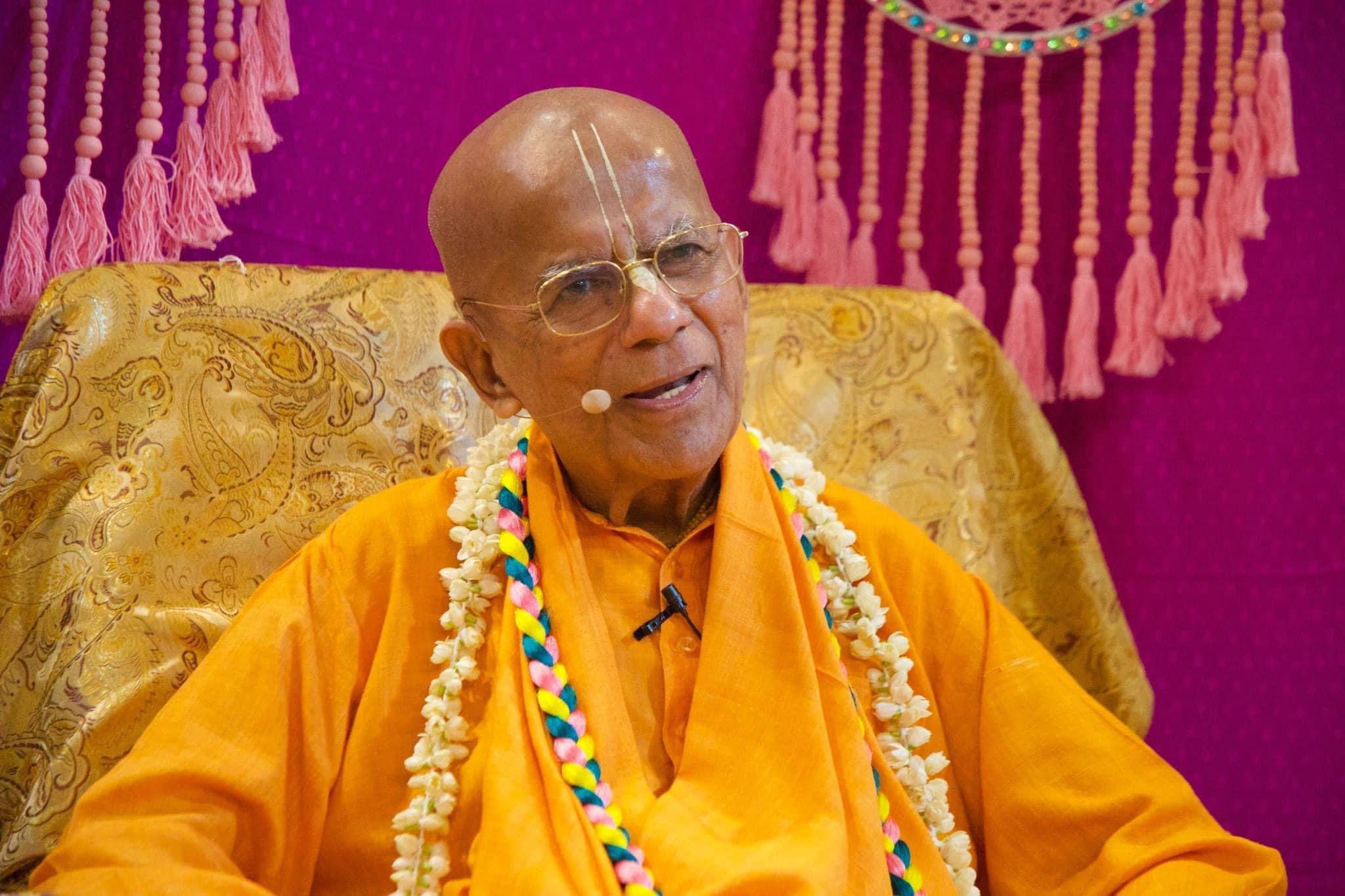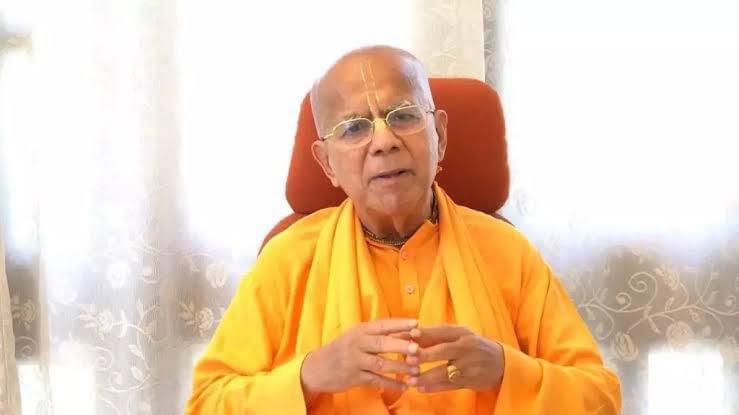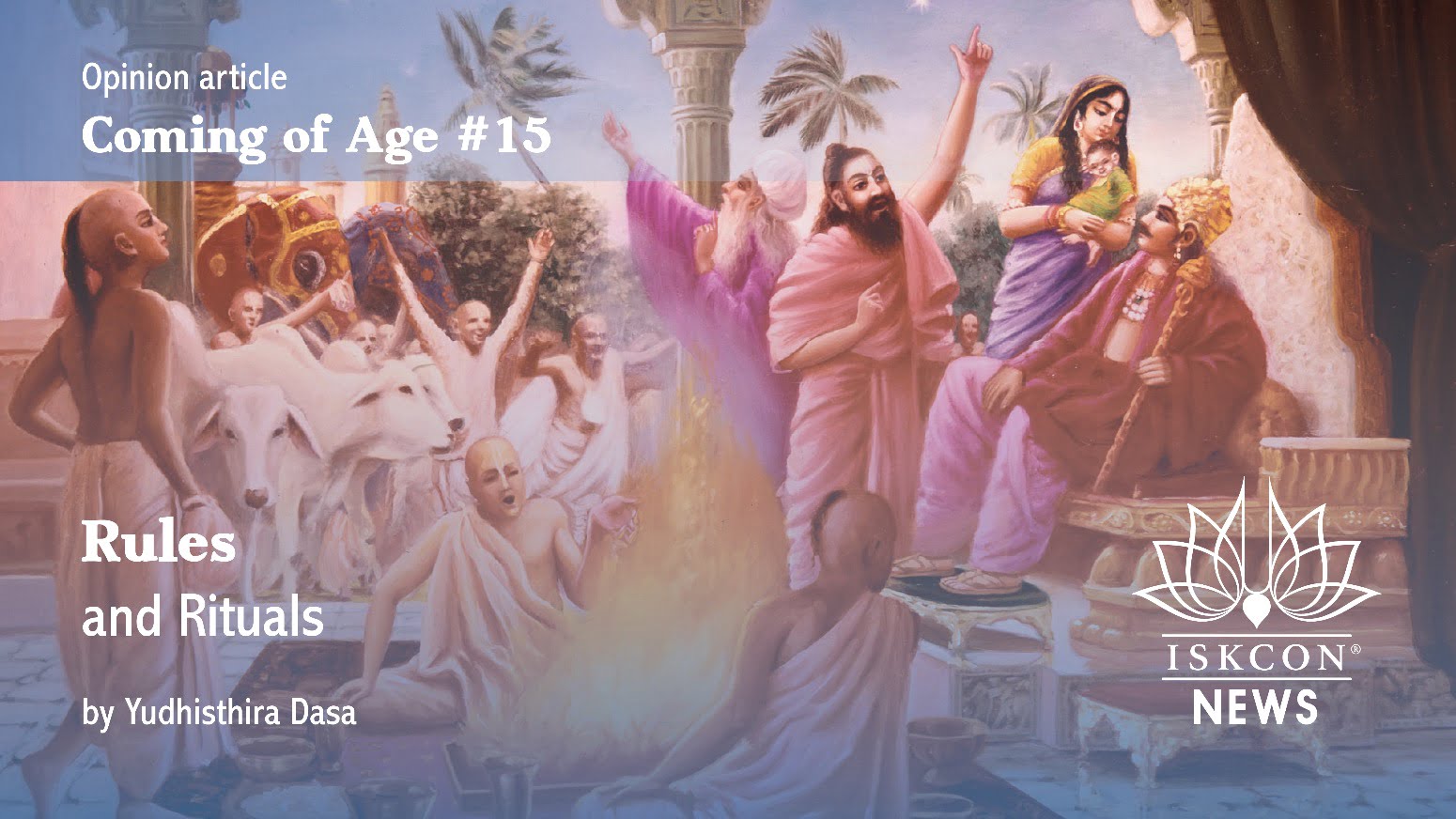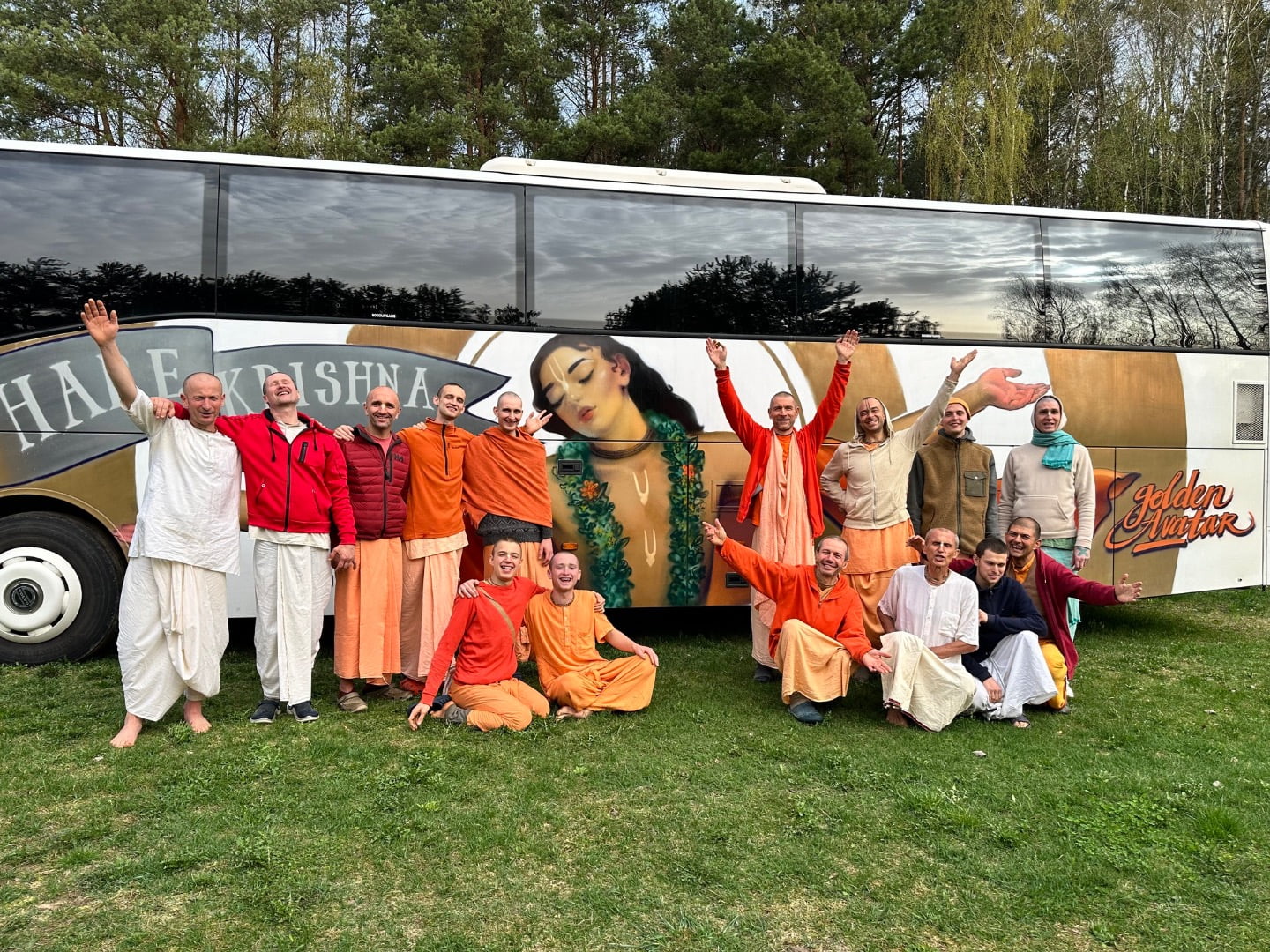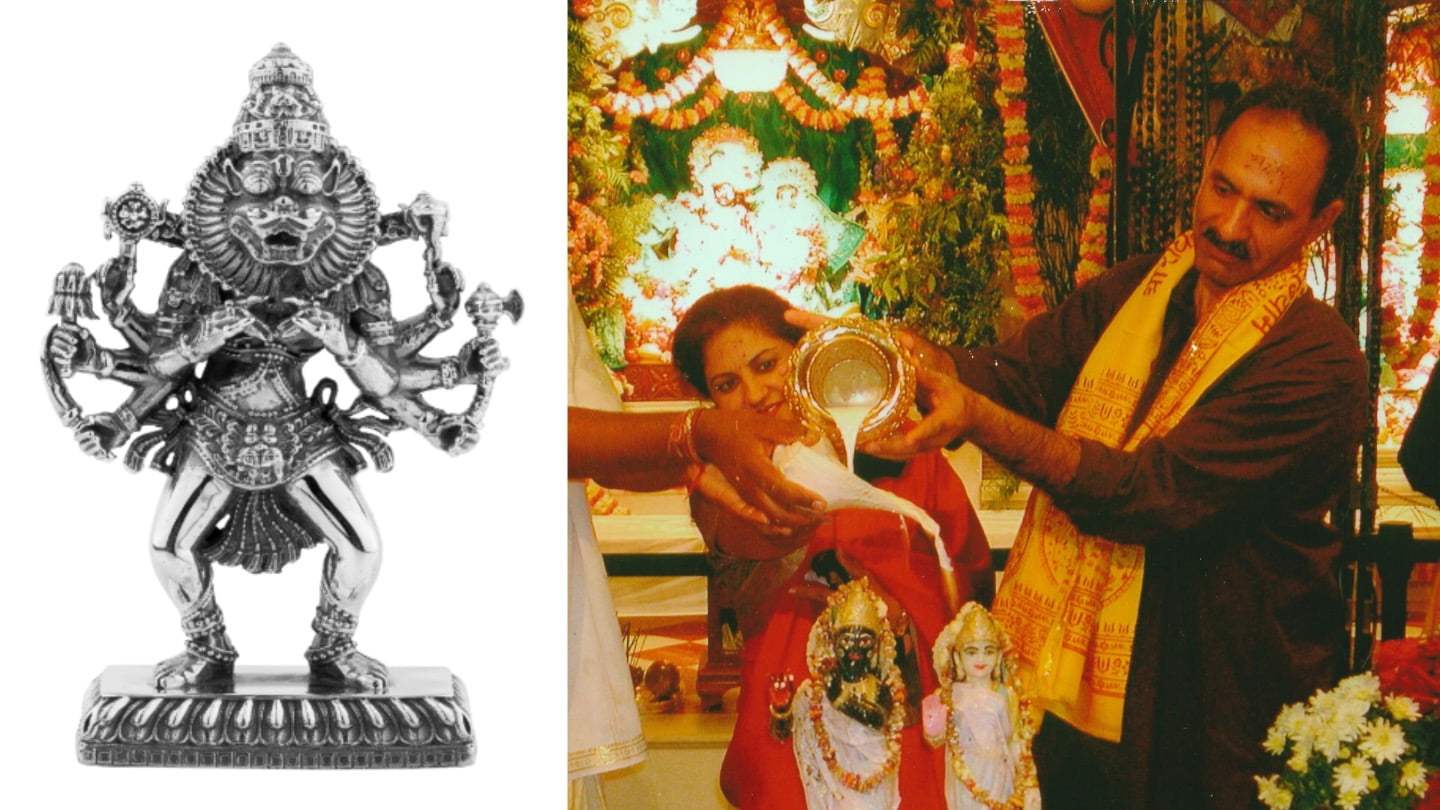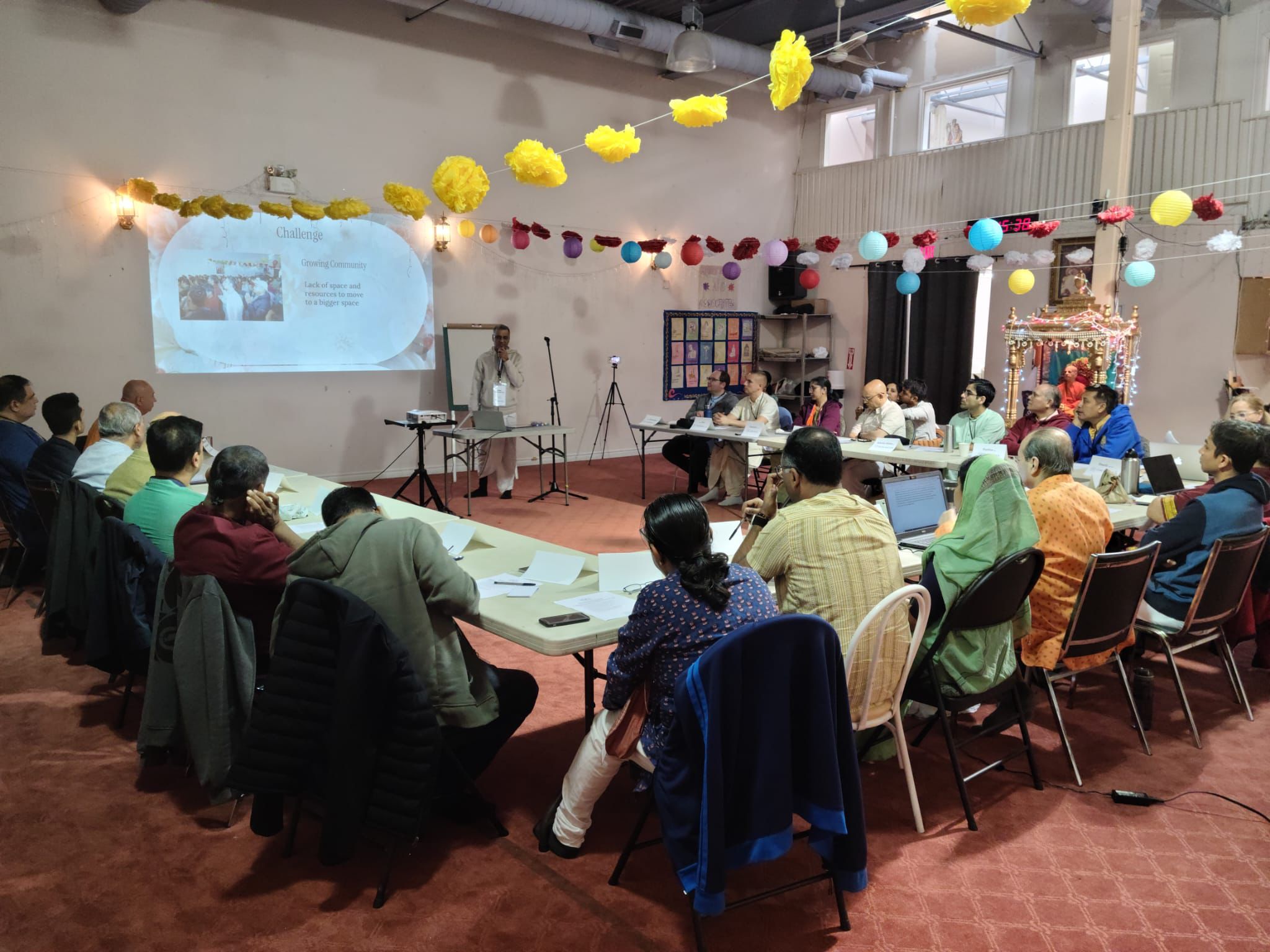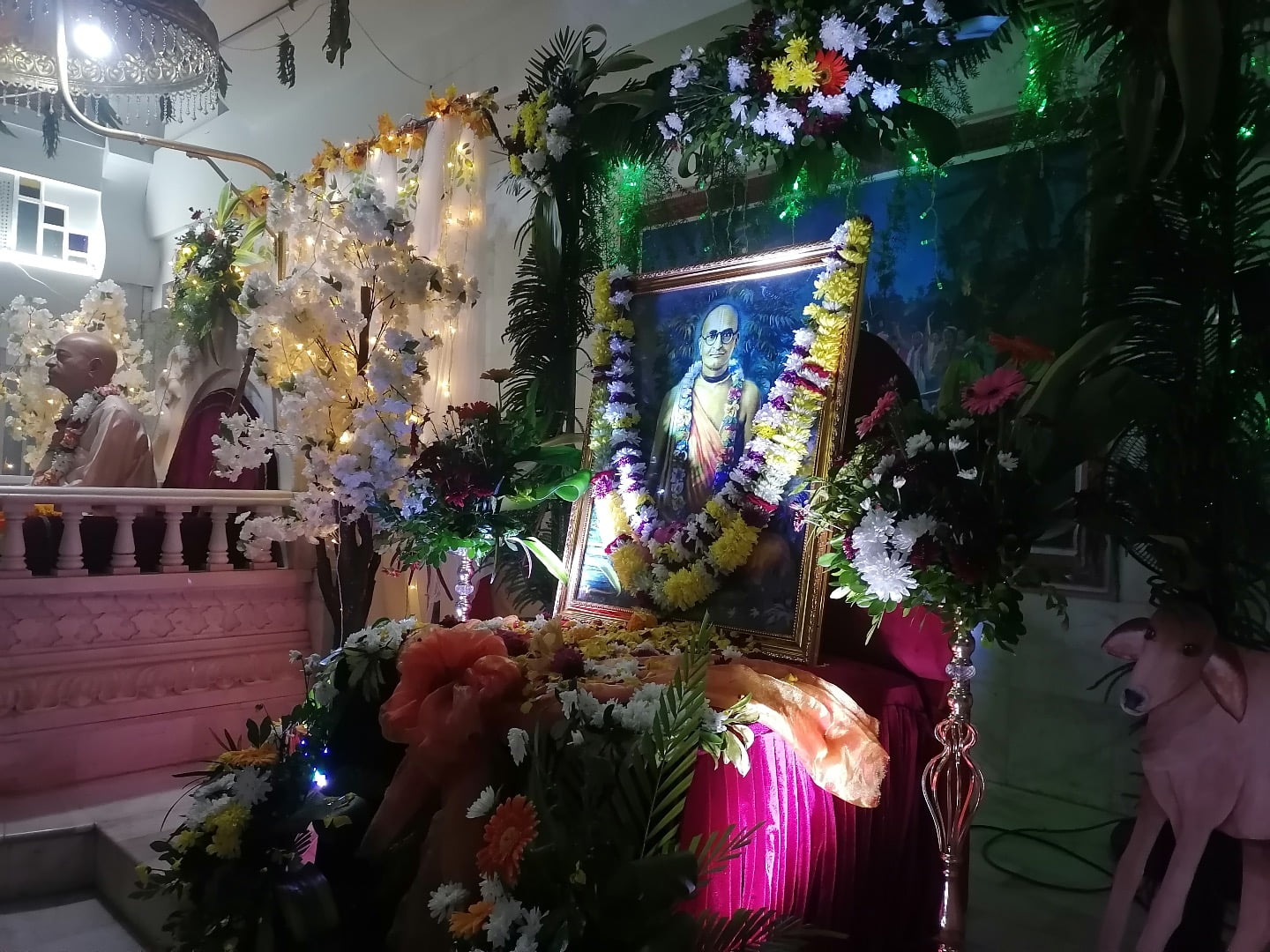Brazil’s Bhaktivedanta Institute Offers Spiritual Refuge
By Bhagavan Dasa | Dec 16, 2017
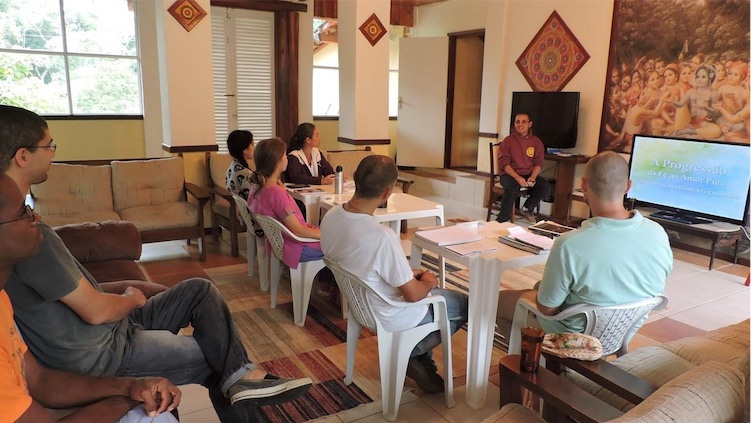
Since a long time in its history, Teresópolis, Brazil, has been considered a good place for rest. Its name, “City of Teresa”, is due to the fact that the empress Mrs. Teresa Cristina, wife of the emperor D. Pedro II, considered the city one of her favorite places for trip and vacations. Among traders coming from north, Teresopolis also represented a landing place, but shorter: on their way to do business in the port of Rio de Janeiro, they would stop for a day in Teresópolis and renew themselves with its mountain beauties before traveling ahead.
Today, this tradition is still alive. When the intensity of Rio de Janeiro becomes too stressful, families or individuals from the capital head for Teresópolis to seek refuge. They take a break from Rio by staying in their own second home, or in one of the many inns of the town.

Organ Mountains (Serra dos Órgãos), one of the postcards of Teresópolis.
In 2017, however, Teresópolis became a refuge for different kind of travelers. Eight people – men and women, adolescents and adults, high school students and doctors – decided to take a break from the daily routine of their life based on studying, working and looking for prestige. Inspired by the books of Srila Prabhupada, they took a radical (in the best sense of the word) decision to put all their other responsibilities on hold and dedicate a few months of their life exclusively to the study and practice of Krishna consciousness in the heavenly Vrajabhumi Ashram.
Marcela Antunes, one of the devotees in the group, recalls how she decided to enroll: “In general, we are very attached to the concepts and prejudices of society, very absorbed in enjoying the pleasures of the world, following the conventional flow of going to university, having a good job, having a house, etc., but where does that lead us to? We want everyone to serve us; we have the ego so inflated that we do not realize that this is not the real purpose of life. Considering all these things, I decided to enroll in the course, taking the opportunity to learn in practice how to serve, following the teachings of Srila Prabhupada.”
During the 6-month course, Marcela and her colleagues actually had the opportunity to ‘learn in practice’. At every garland workshop, puja practices or singing lessons and musical instruments, the stance of service to Krishna, the essential quality sought by a bhakti-yoga practitioner, was looming. “Today I feel myself more willing to always serve,” said Gopi-bharta Devi Dasi, another student from the pilot group, on graduation day.
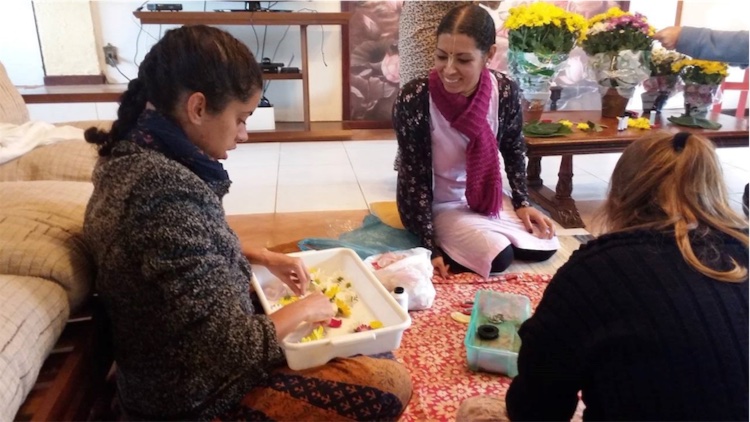
Devotees in garland class.
On the importance of immersion in a community, Chandramukha Swami, IBEV (Bhaktivedanta Institute of Vedic Studies) founder, commented frankly: “What we have seen is that very few people are achieving a good spiritual standard without living in a temple. I am not saying that it is impossible, but it is rare. The person ends up staying too much on the internet, and gets overly involved in politics… Then, Krishna consciousness is just one thing among many others, and this mentality arises: ‘Prabhupada is nice, but something was missing’ or ‘Krishna consciousness is nice, but the world has changed.’ Very soon, that person ceases to chant the holy names and wastes the human form of life. So the immersive study at IBEV is meant to be something that inspire the students to dedicate themselves completely to Krishna consciousness.”
In this vein, the students received from very competent teachers all the scriptural basis left by Srila Prabhupada and previous masters, supporting Krishna’s invitation to see Him in everything and make everything an offering to Him. Systematic contents such as the six symptoms of bhakti described in The Nectar of Devotion or the nine phases of devotional service described in Madhurya Kadambini revealed to the enthusiastic students why the Vaishnava devotional tradition is often referred to as ‘scientific’ by Srila Prabhupada.
“The students really showed great interest in practically every subject,” says Nrisimhananda, teacher at IBEV and president of Vrajabhumi Ashram, “but some topics have been especially attractive to them. This was the case with the Brahma-samhita study. They were really impressed by how the book succeeds in summarizing the essence of Vaishnava teachings in less than a hundred verses, and in a very poetic way at the same time.”
The routine of studies and practices is intense. One of the students recalls: “In my imagination, the words ‘retreat’ and ‘monk’ had a connection with ‘free time’. I was wrong!” In the morning, devotees wake up very early for the first ceremonies at the Krishna-Balarama temple at 4:30 AM. After the first celebrations, they dedicate themselves to chanting japa for 2 hours. Well! Actually, they have to check the service timetable of the day. Some are priest assistants, while others prepare the community breakfast.
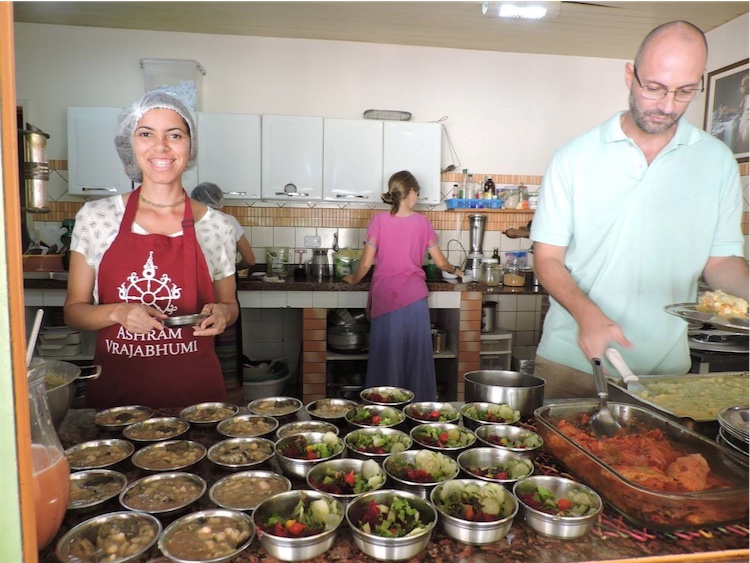
Students helping in the kitchen.
At 7:30 AM there is more activities in the temple: chanting of mantras and study of Srimad-Bhagavatam. For the rest of the morning, there are the subjects called “monastic practices”, which include activities such as study of the mantras sung daily, vaishnava etiquette, sankirtana theory, mridanga drum practice and activities in the organic vegetable garden. In the afternoon, there are the studies of denser philosophy, stretching to close to the nightly program in the temple, with more mantras and study of the Bhagavad-gita.
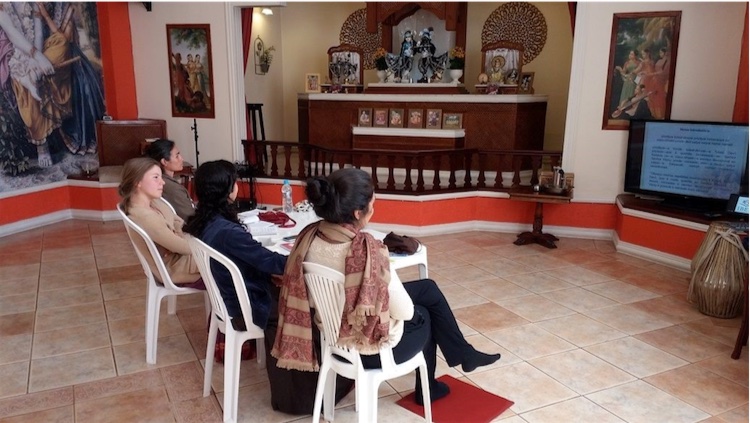
Study of the meaning of songs, in the temple.
All the above things has something to do with the investment students have come to make in themselves: to learn and practice bhakti-yoga for their own elevation. But, of course, it would be contradictory to practice bhakti-yoga without wanting to benefit others; after all, dedicating oneself to the good of others is the very essence of the spiritual path. Therefore, during the course, students are directed to activities of propagation of Krishna consciousness. Each month, for example, two weeks are devoted to the practice of sankirtana, the distribution of Srila Prabhupada’s books on the streets.
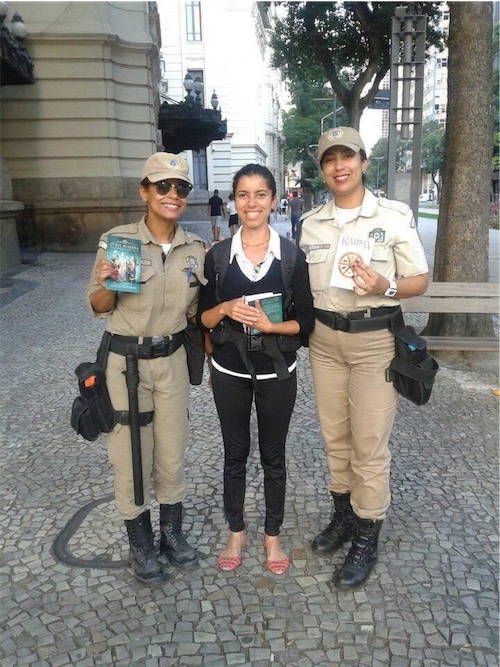
Student Marcela (middle) posing for a photo after having sold Karma and King Avatara to two policewomen.
IBEV has the official support of BBT Brasil. Nanda Kumara, president of the publishing house, comments on the importance of sankirtana: “It is vital for all generations, since it is a tool that nurtures, besides the missionary spirit, austerity, purity and mercy, ability to resolve conflicts and dependence on Krishna – all fundamental elements for a devotee of Krishna consciousness.”
Dhira Chaitanya, who trained the devotees of IBEV for sankirtana practices and accompanied them on their travels, agrees: “According to the teachings of the Bhagavad-gita, the devotee of Krishna has a duty to contribute to the propagation of this sublime message. In fact, the missionary spirit is Srila Prabhupada’s greatest legacy.”
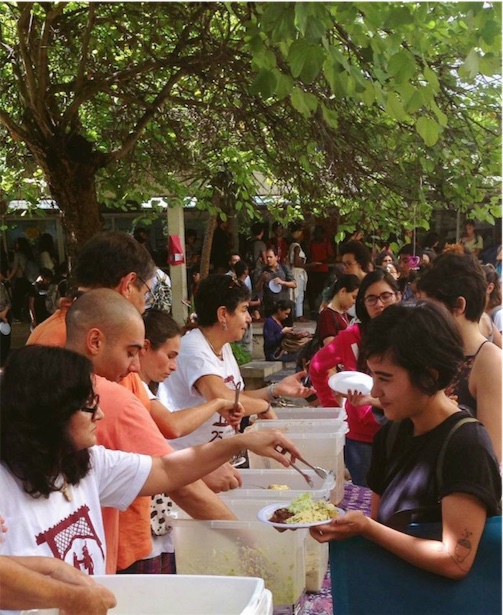
Staff and students of IBEV serving prasadam at Food for Life in UFRJ.
Other outreach activities in which students participated included prasada distribution in the Food for Life project at UFRJ (Federal University of Rio de Janeiro), assistance in the organization of a Ratha-yatra in Belo Horizonte, interreligious dialogue and production of interviews for Back to Godhead.
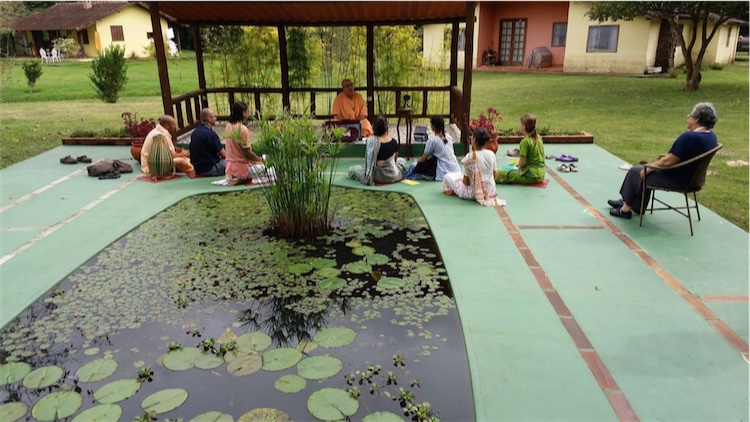
Students interviewing Chandramukha Swami.
“In our meetings before the beginning of the course, we decided that it was very important for students to come up with real, tangible things, not just essays and papers for internal presentation. We wanted them to feel useful in Srila Prabhupada’s mission from the very beginning, with solid contributions, such as book distribution,” says Nrisimhananda.
In fact, it was not necessary to go very far to do so. After all, since IBEV is located in Vrajabhumi, interested and intelligent people were always around. In the community, there are about 30 retreats per year, with the most varied topics and proposals, ranging from cooking to immersion in the Bhagavad-gita, and students participate as listeners and also contribute actively.
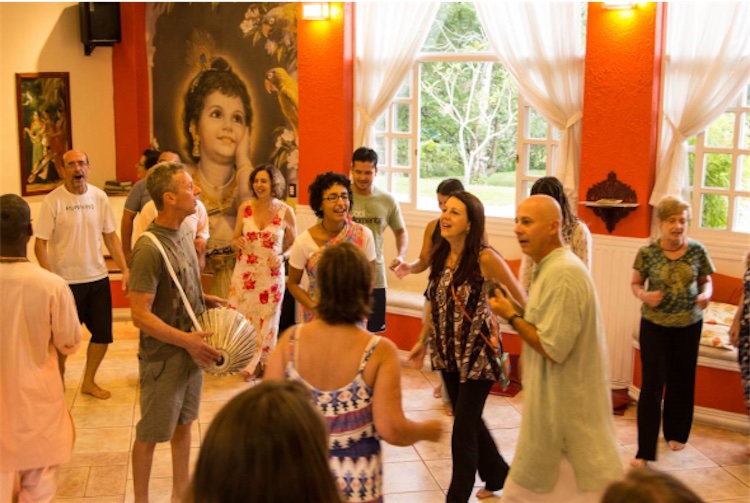
Vrajabhumi holds about thirty retreats a year.
It is also noteworthy that IBEV became a pioneer for being possibly the first course of bhakti-yoga to use elements of “gamification”, application of game-design elements in its curriculum. This new concept, applicable to different contexts, has been gaining a great deal of ground in education in schools that are innovative and attentive to the characteristics of the new generations, and it consists in motivating students with elements typically found in games.
Instead of having a test at the end of the module, for example, IBEV students participated in the exciting ‘Vraja Game Show’. Students were evaluated with multiple-choice questions, true or false questions, etc., as they would be on a test, but this happened as if they were attending an auditorium program. Vraja Game Show includes games that resemble Wheel of Fortune, among others. Radesh Dasa, one of the students, happily remembers it: “The Vraja Game Show was a very dynamic and fun way to learn. The competition encouraged me to memorize more content. To this day I remember the questions about the Bhagavad-gita!”
Another gamification revolved around the Rajasuya Expedition, a card game in which students play the role of tax collectors in the service of King Yudhisthira. “Real activities provided benefits in the game, what subtly showed us the importance of getting up early, studying and doing various services. To receive cards, we had to be punctual in mangala-arati, for example,” comments one of the students, Mateus Jonas. “I saw the game as a great way to help us improve as a person, in a relaxed and jovial way. We were already accustomed to these kinds of games before accepting devotional life, but now, connected with Krishna, it got much better.”
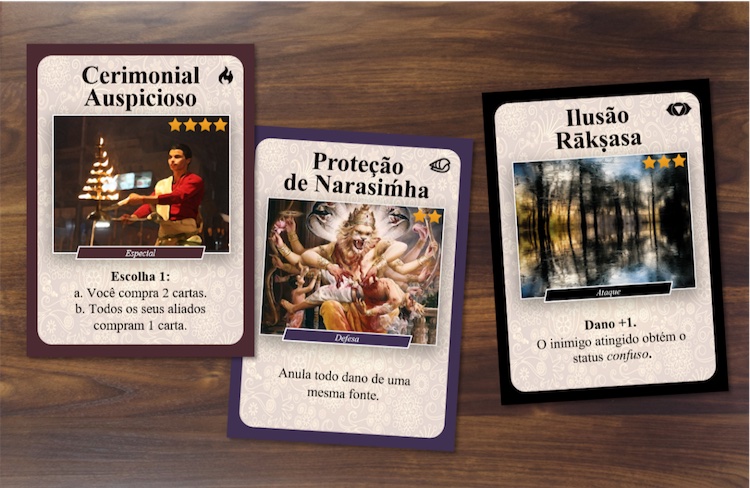
Three of the 108 cards of Rajasuya Expedition game, created exclusively for use in the IBEV.
And what do the students of IBEV do after graduation? “The idea is not to stay on the boat for 6 months and then jump into the ocean,” says Chandramukha Swami. “The proposal to understand philosophy and live the scriptures has to be a permanent thing. The material world is not offering anything incredible, let’s be honest.”
Fortunately, all students leave IBEV better than when they began their studies. Some of them decided to live in Vrajabhumi and assist in its outreach programs while being engaged in their own training, such as attending higher education and obtaining a driver’s license. Other students now live in the Nova Gokula farm and other temples in Brazil, and assist their communities in different capacities. Others returned to their families and strive to apply what they learned in their own lives.
* * *
IBEV has opened enrollment for 2018. All the information and the pre-registration request form can be accessed through this link: www.ibev.com.br/curso-de-estudos-e-praticas-de-bhakti-yoga.





